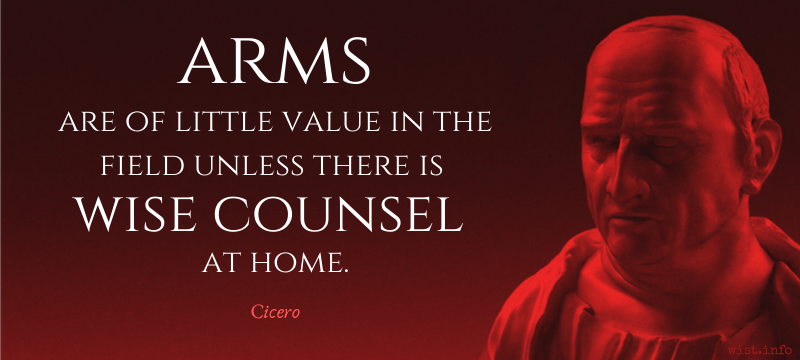Diplomacy mostly consists of managing crazies who are making unreasonable demands in impossible situations with no solutions. And those are just our allies.
Nicholas Kristof (b. 1959) American journalist and political commentator
“The Foreign Relations Fumbler,” New York Times (16 Sep 2012)
(Source)
Quotations about:
foreign affairs
Note not all quotations have been tagged, so Search may find additional quotes on this topic.
They know of no solutions to the paradoxes of the Middle East and Europe, the Far East and Africa except the landing of Marines. Being baffled, and also being very tired of being baffled, they have come to believe that there is no way out — except war — which would remove all the bewildering paradoxes of their tedious and now misguided attempts to construct peace. In place of these paradoxes they prefer the bright, clear problems of war — as they used to be. For they still believe that “winning” means something, although they never tell us what.
C. Wright Mills (1916-1962) American sociologist, academic, author [Charles Wright Mills]
The Causes of World War Three (1958)
(Source)
For arms are of little value in the field unless there is wise counsel at home.
[Parvi enim sunt foris arma, nisi est consilium domi.]
Marcus Tullius Cicero (106-43 BC) Roman orator, statesman, philosopher
De Officiis [On Duties; On Moral Duty; The Offices], Book 1, ch. 22 (1.22) / sec. 76 (44 BC) [tr. Miller (1913)]
(Source)
Peabody comments, "A verse, quoted probably from some lost comedy, the measure being one employed by the comic poets." None of the other translators call this out or show the text as separate except Peabody.
(Source (Latin)). Alternate translations:For armies can signify but little abroad, unless there be counsel and wise management at home.
[tr. Cockman (1699)]Armies abroad avail little, unless there be wisdom at home.
[tr. McCartney (1798)]An army abroad is but of small service unless there be a wise administration at home.
[tr. Edmonds (1865)]Valor abroad is naught, unless at home be wisdom.
[tr. Peabody (1883)]An army in the field is nothing without wisdom at home.
[tr. Gardiner (1899)]For weapons have small value abroad unless there is good advice at home.
[tr. Edinger (1974)]
The dread of being duped by other nations — the notion that foreign heads are more able, though at the same time foreign hearts are less honest than our own, has always been one of our prevailing weaknesses.
Jeremy Bentham (1748-1832) English jurist and philosopher
Principles of International Law, Essay 4 “A Plan for Universal and Perpetual Peace” (1796-89)
(Source)
Physicists and astronomers see their own implications in the world being round, but to me it means that only one-third of the world is asleep at any given time and the other two-thirds is up to something.
We have no eternal allies, and we have no perpetual enemies. Our interests are eternal and perpetual, and these interests it is our duty to follow.
There can be no greater error than to expect or calculate upon real favors from nation to nation. It is an illusion which experience must cure, which a just pride ought to discard.
We must show by our behavior that we believe in equality and justice and that our religion teaches faith and love and charity to our fellow men. Here is where each of us has a job to do that must be done at home, because we can lose the battle on the soil of the United States just as surely as we can lose it in any one of the countries of the world.
The question [is] asked, “Is it common for a nation to obtain a redress of wrongs by war?” The answer to this question you will of course draw from history. In the meantime, reason will answer it on grounds of probability, that where the wrong has been done by a weaker nation, the stronger one has generally been able to enforce redress; but where by a stronger nation, redress by war has been neither obtained nor expected by the weaker. On the contrary, the loss has been increased by the expenses of the war in blood and treasure. Yet it may have obtained another object equally securing itself from future wrong. It may have retaliated on the aggressor losses of blood and treasure far beyond the value to him of the wrong he had committed, and thus have made the advantage of that too dear a purchase to leave him in a disposition to renew the wrong in future. In this way the loss by the war may have secured the weaker nation from loss by future wrong.
Thomas Jefferson (1743-1826) American political philosopher, polymath, statesman, US President (1801-09)
Letter to Noah Worcester (29 Jan 1816)
(Source)
But to those who expect us to calculate whether a compliance with unjust demands will not cost us less than a war we must leave as a question of calculation for them also whether to retire from unjust demands will not cost them less than a war. We can do to each other very sensible injuries by war, but mutual advantages of peace make that the best interest of both.
Thomas Jefferson (1743-1826) American political philosopher, polymath, statesman, US President (1801-09)
State of the Union Message (8 Nov 1804) [ME 3:369]
(Source)
The crisis in which [our country] is placed cannot but be unwelcome to those who love peace, yet spurn at a tame submission to wrong.
Thomas Jefferson (1743-1826) American political philosopher, polymath, statesman, US President (1801-09)
Letter to the New York Tammany Society (29 Feb 1808)
(Source)
Sent to Jacob Van Dervoort, and addressed to "the Society of Tammany or Columbian order No. 1 of the city of New York."
Saints can be pure but statesmen must be responsible. As trustees for others, they must defend interests and compromise principles. In politics, practical and prudential judgment must have priority over moral verdicts.
I have ever deemed it fundamental for the United States never to take an active part in the quarrels of Europe. Their political interests are entirely distinct from ours. Their mutual jealousies, their balance of power, their complicated alliances, their forms and principles of government, are all foreign to us. They are nations of eternal war.
Thomas Jefferson (1743-1826) American political philosopher, polymath, statesman, US President (1801-09)
Letter to James Monroe (11 Jun 1823)
(Source)
The Americans are poor haters in international affairs because of their innate feeling of superiority over all foreigners. An American’s hatred for a fellow American (for Hoover or Roosevelt) is far more virulent than any antipathy he can work up against foreigners. […] Should Americans begin to hate foreigners wholeheartedly, it will be an indication that they have lost confidence in their own way of life.
Eric Hoffer (1902-1983) American writer, philosopher, longshoreman
True Believer: Thoughts on the Nature of Mass Movements, Part 3, ch. 14, § 73 (1951)
(Source)
So let us begin anew — remembering on both sides that civility is not a sign of weakness, and sincerity is always subject to proof. Let us never negotiate out of fear. But let us never fear to negotiate.

















